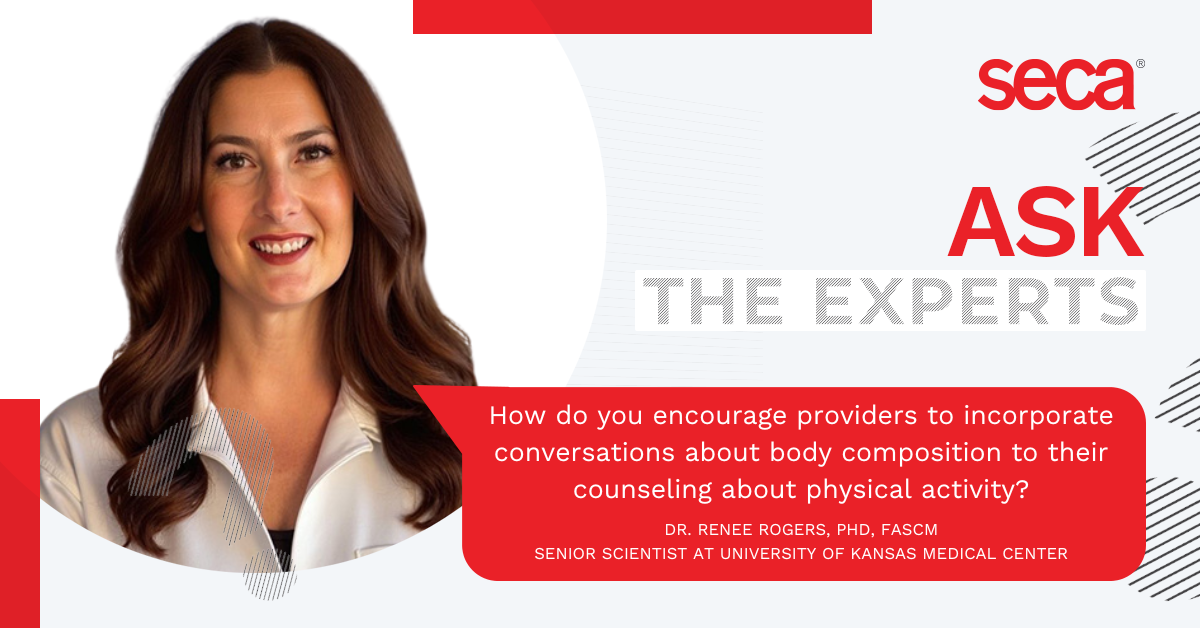Ask the Experts: Dr. Renee Rogers on Body Composition in Counseling & Activity

We asked Dr. Renee Rogers, PhD, FASCM, Senior Scientist at University of Kansas Medical Center , “How do you encourage providers to incorporate conversations about body composition to their counseling about physical activity?”
So across that spectrum, one of the most important things we can do when we’re trying to promote healthy lifestyle, especially exercise, is to step back and say, “talk to me about your history. How do you feel about exercising and getting out there?” And then listen to what they have to say before we lay a blanket recommendation on top of them. Resistance training is really important as we think about body composition and potentially maintaining muscle mass and improving upon the lean mass component of our body, but you can benefit from stepping back and first understanding where they’re at with their relationship with physical activity and exercise.
Sometimes it feels really good to say things like “We need you to resistance train because we want to make sure that you don’t lose muscle mass”. And yes, that is important. But it’s almost a scare tactic when you say “you have to do this, it’s really important”. We’ve found it sometimes leads to that all-or-nothing thinking with folks. And those that aren’t ready to do it are the ones that end up shying away, from a behavioral standpoint. By stepping back a little bit and talking about it in a different light, it may open the door to talk about a feasible strategy.
The new twist on the conversation is coupling language with that biological measurement of their body composition that’s giving us more information. We’re also now guiding the patient in the right direction, without it being like, “you must go to the gym and you must resistance train” because for years, we’ve been telling people this is important and for years, folks haven’t been doing it. You can use that body composition data to talk to them about what their relationship is right now with movement in their life, and bringing those two things together can maybe help bridge the gap and you both together can make a really nice short-term goal.
Incorporating body composition data into counseling about physical activity is a powerful way to engage patients and foster meaningful lifestyle changes. Dr. Renee Rogers emphasizes the importance of meeting individuals where they are, understanding their relationship with movement, and creating personalized, achievable goals. By coupling biological insights with compassionate communication, providers can inspire lasting health improvements.
For more insights on integrating exercise, lifestyle, and medical care, connect with Dr. Renee Rogers on LinkedIn.
About Dr. Renee Rogers:
Dr. Renee Rogers is an expert in bio-behavioral healthy lifestyle interventions, focusing on integrating medical care with meaningful behavior change. She specializes in the role of exercise and lifestyle in managing obesity, chronic conditions, and healthy aging. Dr. Rogers’ work centers on research and education, driving impactful solutions for long-term health and wellness.
seca north america
Medical Measuring Systems and Scales since 1840
13601 Benson AvenueChino, CA 91710
USA
seca Service
As the world leader in medical scales, we also offer you first-class service. Together with our branches, partners and dealers, seca offers a worldwide service network that ensures our products work troublefree.
All rights reserved seca 2023